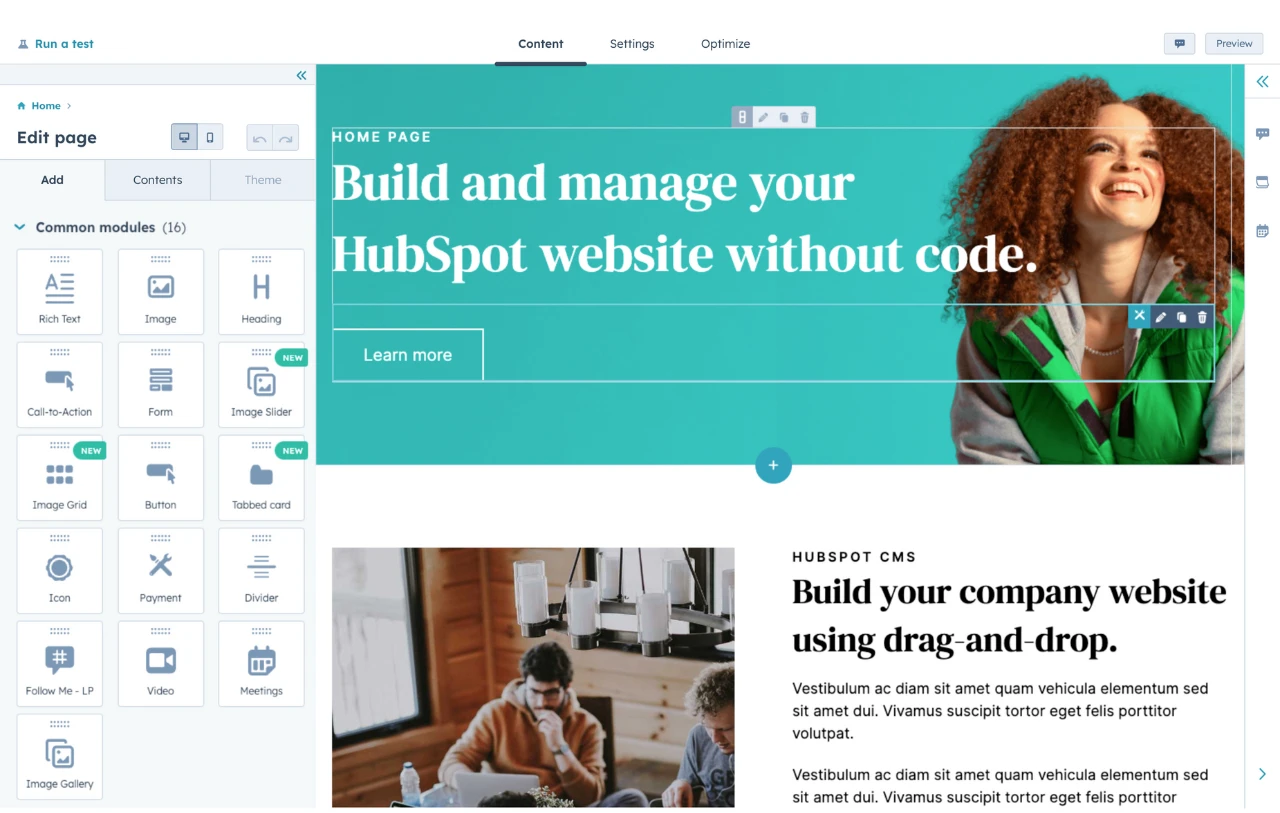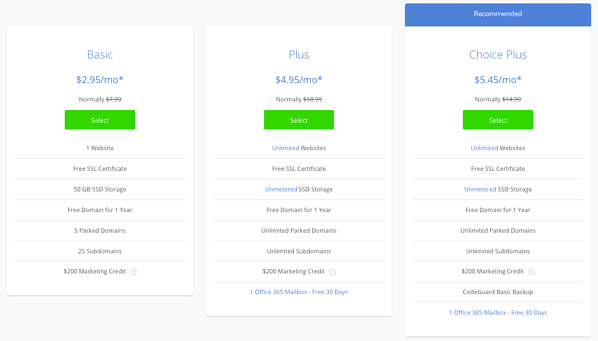With an increasingly competitive blog market, you might be wondering how you can build a website to keep up. In this article, we will review Blogger vs WordPress as two of the top options you can use to run your blog.
When starting a blog, you’ll want to consider the advantages of using a publishing platform like Blogger vs WordPress, a content management system.
With a publishing platform like Blogger, you can quickly create a blog by creating an account, selecting a template, and adding content. Because Blogger takes care of all the technical aspects of running a blog, you can focus on publishing content and understanding what topics and types of posts are popular among your readers.
Start a Blog with HubSpot's Free Blog Maker
This enables you to establish yourself as a thought leader in a particular industry and grow your readership without paying for features and services you aren’t taking advantage of.
With an open-source CMS like WordPress, you need to download and install the software and pay a small monthly fee for hosting from a third-party provider like Bluehost. You’re also in charge of the security, performance, and maintenance of your blog.
While this greater degree of ownership will require more time, effort, and budget, it will also afford you more freedom. You can select your own hosting plan, install any theme and plugin you want, and edit the source code as you please.

Free Blog & Website Builder
Create and customize your own business website with an easy drag-and-drop website builder.
- Build a website without any coding skills.
- Pre-built themes and templates.
- Built-in marketing tools and features.
- And more!
Now that we understand the different software powering Blogger and WordPress let’s take a closer look at the following key differences so you can select the right solution for your site:
Click any of the links above to jump to a specific section of the post, or keep scrolling.
Blogger vs. WordPress
Blogger is a free blog hosting service by Google. Due to its ease-of-use and low costs, Blogger is a popular platform for beginners to create simple blogs. Users looking for more control over their blog’s appearance and functionality can self-host a site on WordPress.org. WordPress is a flexible content management system that provides the customization options and advanced features needed to build large and more complex blogs.
Now that we’ve given a brief overview of the differences between Blogger and the self-hosted variant of WordPress let’s compare their flexibility in more depth.
Blogger vs. WordPress Flexibility
When building a blog, you want a platform that's easy to use and flexible. How flexible a platform is, comes down to control. How much control do you have over the appearance of your blog? What about functionality?
With these two questions in mind, let's compare the flexibility of Blogger and WordPress below.
Blogger Flexibility
With Blogger, you can publish multimedia content, like blog posts or GIFs, to attract readers and grow your brand without worrying about site maintenance or paying for anything other than a custom domain. In exchange for this ease of use and low cost, you’ll forfeit virtually all control over your site.
The most important thing to note with Blogger is that you don't own your site, so it can be suspended at any time if you're found in violation of Blogger's community guidelines. You also have little control over the appearance and functionality of your site.
For example, the default homepage of your blog will be a feed of your posts in reverse chronological order — and you can't change the layout or even the order of your content. You can't create custom post types or pages, like portfolio pages, either.
It's important to note that you can edit the HTML of your site and add custom CSS using the built-in module shown below. This is almost identical to the CSS module in the WordPress dashboard.

WordPress Flexibility
For more control over the design and functionality of your blog, you can create and manage a self-hosted blog on WordPress.
With a content management system, you can choose the colors, fonts, and layouts of your blog. You can create, edit, schedule, update, and manage your content. You can create custom post types.
You can add social media buttons, forms, affiliate links, and other features via plugins. You can also add custom CSS to your WordPress dashboard or edit the source code of your site to perform more advanced tasks, like creating a sticky navigation menu, setting up an error log, or changing the style of each of your category pages. Here's a look at the built-in CSS module where you can add code to customize your page.

Blogger vs. WordPress Plugins
All website-building platforms offer valuable built-in functionality that makes them an appealing alternative to building a website from scratch. However, no single website-building platform can offer enough built-in features to meet the needs of every site owner. That's why most platforms offer third-party extensions to download or purchase.
Let's compare the extensions of Blogger and WordPress below.
Blogger Plugins
Blogger does have some third-party widgets that you can install by adding code in the HTML of your site or directly in the body of your posts or pages. Elfsight, for example, offers over 50 widgets for embedding Instagram posts, Google reviews, a WhatsApp button, and more onto your Blogger site. However, in its documentation, Blogger warns that authors who add third-party widgets or code do so at their own risk.
Instead, what Blogger recommends is “gadgets," developed by Google and other developers, which you can add to your site to do things like insert Adsense ads, display an archive of your posts, add search functionality to your site, and more.
Note that there are only 26 gadgets, some of which are already added by default.

That means Blogger is easy to learn and use but limited in functionality. That's especially true compared to WordPress, which offers more built-in features and tens and thousands of extensions.
WordPress Plugins
WordPress has the largest collection of third-party extensions compared to any other platform. It has over 60,000 free plugins in the official plugin directory, with thousands more premium options available in third-party marketplaces. In CodeCanyon, for example, there are over 5,100 plugins for sale.

That means there's a WordPress plugin for virtually anything you want to do. Want to add email marketing, marketing automation, live chat, forms, and more to your site? Want to grow your social shares and followers? Want to add an email opt-in form to your site? You can do this and more with WordPress plugins.
While WordPress's vast selection of plugins means you'll have countless customization options, it also means you’ll have more to learn and manage than on Blogger.

HubSpot's Free Website Builder
Create and customize your own business website with an easy drag-and-drop website builder.
- Build a website without any coding skills.
- Pre-built themes and templates.
- Built-in marketing tools and features.
- And more!
Blogger vs. WordPress Templates
In addition to third-party extensions, most website-building platforms come with pre-designed templates. Not having to build your website from scratch is a major benefit — it not only makes the setup process faster but also enables every user to create a beautiful website without needing to rely on designers or developers.
Below we’ll compare the selection and customizability of Blogger and WordPress templates.
Blogger Templates
Blogger provides 12 template designs, some of which come in different color schemes. These are easy to install and customize.
Using the built-in editor, you can customize the colors, text, and background of your posts, pages, navigation, sidebar, and links.
.webp?width=700&height=399&name=6%20Bloggers%20customization%20options%20panel%20(1).webp)
Advanced users with coding knowledge can also add custom CSS to further style their templates.
It's important to understand that Blogger and any third-party sites with Blogger templates only offer single templates, not themes or template kits. If you're creating a multi-page blog on Blogger, you'll have to use the same template for all your pages.
The limited selection of templates and customization options does make the design process extremely fast and easy on Blogger, but it can be frustrating. To create a blog that reflects your unique brand identity, you'll need a platform with a larger selection of more customizable templates.
WordPress Templates
While you can find WordPress templates on third-party sites, WordPress is best known for its themes. A WordPress theme is a collection of template files and a stylesheet that modifies how a site is displayed. So whereas a template defines the layout of one page, a theme controls the design of an entire website.
In the official WordPress theme repository, there are over 10,000 free themes alone. There are thousands more free and premium ones available in third-party marketplaces like Themeforest Marketplace. It’s estimated that there are over 30,000 WordPress themes in total.
Installing and customizing WordPress themes is easy but will take more time than installing and customizing templates on Blogger. That's because most WordPress themes are highly customizable.
If you're using WordPress's built-in customizer, then it'll look a lot like Blogger’s. You can change your colors, menus, and widgets, and add custom CSS. But if you want even more customization options over your theme and design elements, you can use a page builder plugin.
Many premium themes already come with a built-in page builder so you don’t have to install anything else. The Divi theme, for example, comes with its own front-end page builder and over 800 pre-made designs (most of which are offered in website packs). Here's a look at a user editing a pre-made layout from the restaurant website pack.

WordPress is so flexible that you can even use different themes on different pages.
Blogger vs. WordPress Price
Whether you’re just starting or have been blogging for years, budget is an important factor to consider when choosing your blogging platform. Let’s compare the costs associated with creating and running a blog on Blogger and WordPress below.
Blogger Price
Blogger is a free blogging platform that provides everything you need to create and launch a blog quickly. You don’t have to pay for hosting, an SSL certificate, or templates. You don’t even have to pay for domain registration if you’re okay with using a blogspot subdomain. In that case, your URL will look something like: www.mywebsite.blogspot.com. (Not to be confused with Blogger, Blogspot is afree domain service provider also owned by Google.)
If you’d prefer a custom domain, then you’ll have to purchase and connect it. You can buy a domain directly from Google or another domain registrar like GoDaddy. A custom domain name typically costs anywhere from $10-20 a year.
What sets Blogger apart from other free platforms like WordPress.com is that it will not run ads on your free site. That’s why many beginners choose to start blogging on this platform.
WordPress Price
Though WordPress is free to use, there are costs associated with building and managing a site on this self-hosted platform. You’ll have to pay for domain registration, hosting, and any premium themes or plugins you want to install.
Because of these variables, building and managing a WordPress site can cost anywhere from a few dollars to a few thousand. Luckily, creating a blog similar to one you’d create on Blogger sits on the lower end of that spectrum. For example, hosting a blog with a free domain on a shared server can cost as little as $3 per month.

Blogger vs. WordPress for SEO
There are different ways to optimize your blog for search engines. You can focus on the technical aspects, like load time, or on-page SEO, like keywords, meta descriptions, links, and images.
To optimize these types of SEO, you want a platform with the built-in functionality and add-ons required to maximize your efforts. Let’s compare the features of Blogger and WordPress below to see which is better for your site.
Blogger for SEO
With Blogger, you can take several steps to optimize your blog for search engines. You can customize your permalinks, add keywords to your post and page titles, add headers, optimize the alt text of your images, hide pages from searches, and tell search engines not to follow certain links.
 Since no plugins are available to help simplify or automate these processes for you, Blogger is ideal for users who are already familiar with or have the time to learn SEO best practices.
Since no plugins are available to help simplify or automate these processes for you, Blogger is ideal for users who are already familiar with or have the time to learn SEO best practices.
WordPress for SEO
With WordPress, you get the SEO features you expect and much more. You can add image alt-text, meta descriptions, headings, and custom URLs in your posts and pages, you can also maintain granular control over every part of your code to ensure it’s optimized.
If you don’t have coding skills or aren’t familiar with SEO best practices, you can download some of the most popular and advanced SEO tools from its plugin directory or third-party sites.
For example, you can install the Yoast SEO plugin to simplify optimizing your on-page SEO. This plugin will offer suggestions for creating readable text, using your keywords, optimizing your meta descriptions and image alt text, and adding internal links. Other plugins will help you optimize your images, generate and update XML sitemaps in one click, integrate with Google Analytics, cache your site, and more to improve your technical SEO.

HubSpot's Free Website Builder
Create and customize your own business website with an easy drag-and-drop website builder.
- Build a website without any coding skills.
- Pre-built themes and templates.
- Built-in marketing tools and features.
- And more!
Blogger vs. WordPress for Blogging
Blogger and WordPress were both originally established as blogging platforms. However, WordPress has since evolved into a multi-purpose content management system that can be used to build nearly any site. That makes Blogger an appealing WordPress alternative for site owners purely focused on blogging.
Let’s consider the blogging features and layouts of each platform below to help you decide if you should go with Blogger or WordPress for your website.
Blogger for Blogging
Blogger provides the standard functionality you’d expect to create and launch a blog quickly.
Like WordPress’s Classic editor, Blogger’s editor looks and functions like a word processor. Once you’ve added text to the post editor, you can then format it using a variety of buttons in the toolbar. You can make bold, italicize, or underline words, change the font color, add links, include bullet lists, and insert images.

To change the appearance of your blog, you can select a free template. Using the built-in template designer, you can easily rearrange elements by dragging and dropping them. However, because this takes place on the back end, you’ll have to click preview to see how the template will look on the front end, go back and make changes, click preview again, and so on until you’re ready to activate the template.

Blogger offers some advanced functionality you can’t find on other free platforms. For example, you can restrict access to your content to a select group of Google users, organize your posts with labels, share them on social sharing sites, and monetize them with Adsense.
But if you’re looking for any other functionality, you’ll need to use a more flexible platform like WordPress.
WordPress for Blogging
While Blogger has remained relatively the same product since the early 2000s, WordPress has constantly been updated and improved. It offers standard blogging options that you might expect — like a drag-and-drop block editor, native commenting system, tags, and categories — and more advanced options for publishing a complex blog.
You can assign user roles and permissions, make your content public or private, secure posts and pages with a password, or build a site in your language. You can also change the appearance of your site by selecting from thousands of themes specifically designed for blogging.
In short, WordPress provides much more control over your blog — but requires a steeper learning curve.
Blogger vs. WordPress Support
Feeling overwhelmed? That’s okay. Learning a new platform while creating and managing a website is hard work. Setting up, customizing, managing, and troubleshooting your site will raise questions. To answer those questions, you’ll need insights from more experienced users, designers, and developers. Depending on your learning type, you’ll need documentation, third-party resources, or 1:1 support.
That’s why it’s essential to evaluate both the support channels and documentation of website-building platforms. Let’s compare the support offered by Blogger and WordPress below.
Blogger Support
Since Blogger is a free publishing platform, Google doesn’t provide one-to-one support to users.
There is a community forum where you can post questions and get answers from other users, as well as a help center where you can find tutorials and other documentation. You can also access these help articles directly from your Blogger dashboard.

WordPress Support
Like Blogger, WordPress also does not have a dedicated support team. However, as an open-source CMS, it does have the largest global community of users.
That means you can check out the WordPress support center, where you'll find an official online manual from the developers of WordPress that covers everything from installing the WordPress software to creating a custom plugin. Or you can browse the over two million topics discussed in the official WordPress support forum.

Or you can find hundreds of video tutorials, online courses, ebooks, and other online resources for beginners on third-party sites and blogs, like the free Build a WordPress Website Course on HubSpot Academy. Or you can reach out to fellow users through support forums or Slack channels and even meet them in person at events worldwide.
Suppose you’re overwhelmed by having so many resources available or can’t find an answer to your specific question. You can check if your hosting provider offers customer support or hire a WordPress developer for more personalized support.
The Key Differences Between Blogger and WordPress
Whether you’re creating a personal or business blog, either Blogger or WordPress has unique advantages. Selecting the right platform will determine how much flexibility, customization, and ownership you want over your blog.
Below you’ll find a summary of the key differences between the two platforms.
| Blogger | WordPress | |
| Software | Proprietary publishing platform | Open-source content management system |
| Flexibility | Very easy to use but less flexible. You can't control the order of your posts or create custom post types, for example, and you don't technically own your blog. But you can edit its HTML and CSS. | Very flexible but less easy to use. You can add rich functionality to your WordPress blog by editing the source code or installing and configuring plugins. |
| Plugins | Some widgets are available on third-party sites but are mostly limited to the 26 built-in gadgets. | Over 60,000 free plugins are available in the official directory. Thousands of premium plugins are also available in third-party marketplaces. |
| Templates | Only 12 templates (with color variations) are available in the Blogger dashboard. Limited customizability unless you're comfortable with adding custom CSS. | Over 30,000 WordPress themes are available for purchase or download. Most are highly customizable. |
| Price | Free with blogspot subdomain. You can purchase a custom domain for $10-20 per year on average. | Free to use the software. Costs associated with domain registration, hosting, and premium plugins and themes range, but you can host a blog with a free domain for as little as $3 per month. |
| SEO | Standard features for customizing your permalinks; adding keywords in post and page titles, headers, and image alt text; hiding pages from searches; and telling search engines not to follow certain links. | In addition to standard features, you can select from hundreds of plugins to simplify optimizing your on-page and technical SEO. |
| Blogging | Offers more functionality than most free platforms — like the ability to restrict access to your blog to particular readers and monetize it with Adsense — but lacks content management features and customization options to create a custom blog. | Offers advanced blogging functionality, including user management, multi-lingual support, a drag-and-drop block editor, and a vast selection of blogging themes. Customization options are virtually limitless via plugins and coding. |
| Support | No dedicated customer support. There is a help center with basic documentation and a community forum where users can ask and answer each other's questions. | No dedicated customer support team. There is an official manual and thousands of tutorials, support threads, slack channels, and events created by the largest global user community. |












